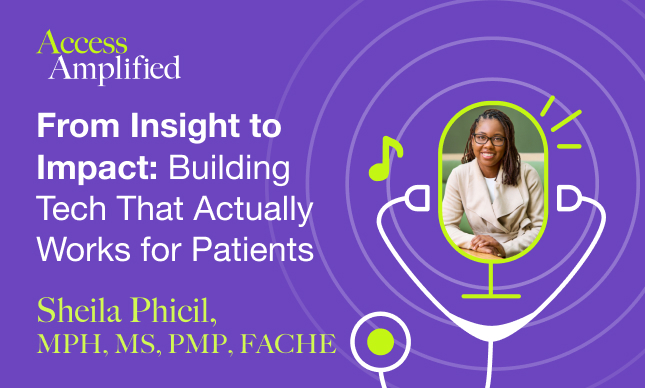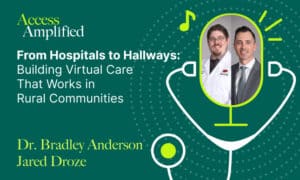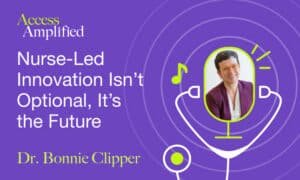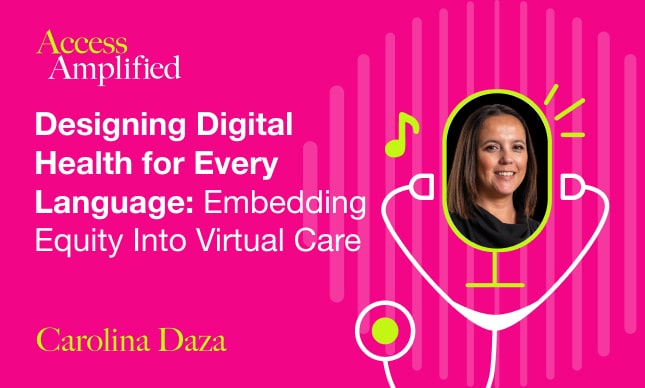From Insight to Impact: Building Tech That Actually Works for Patients

Sheila Phicil has spent her career inside some of the country’s leading health systems before launching Phicil-itate Change, a new innovation studio focused on building tech that actually works for the patients it’s meant to serve. In this episode, Sheila breaks down why so many digital health tools fail, what real-world patient engagement looks like, and how health systems can get closer to product-system fit by designing with, not just for, the people they serve.
Watch the live recording
Sheila Phicil knows both sides of the equation. After nearly two decades leading innovation inside hospitals like Brigham and Women’s and Boston Medical Center, she’s now building a platform designed to solve one of digital health’s biggest gaps: understanding what patients actually need.
In this episode, Sheila explains why 98% of digital health startups fail and how health systems can learn from those failures. She introduces the SEEDS framework, a practical approach to equity-centered innovation, and shares stories of tools that succeeded because they were easy, human-centered, and designed to reduce friction across the entire system.
We also hear about Listen Phirst, a new AI-enabled platform that lets patients share their experiences in real time, in their own language, in their preferred format, and with control over how their data is used. Her advice to founders and care teams: design for the patients with the most barriers, and you’ll end up creating a solution that works better for everyone.
Meet Sheila Phicil
Sheila Phicil is a social change futurist™ reshaping how the world builds technology for care. As the founder of Phicil-itate Change, she leads an innovation studio that transforms complex healthcare challenges into market-ready, radically patient-centered solutions—embedding justice into design from day one.
At the heart of Phicil-itate Change is the SEEDS Innovation Framework, a structured methodology Sheila created to accelerate product-system fit. SEEDS guides innovators from problem validation to scaling by co-designing with patients, aligning with healthcare ecosystems, and ensuring sustainable adoption. It’s used by founders, accelerators, and health systems to de-risk innovation and secure meaningful traction.
Sheila is also the creator of the COMPASS Platform, a blockchain- and AI-enabled infrastructure that collects multilingual, multimodal patient narratives and transforms them into real-time design intelligence. Patients retain dynamic consent and are compensated each time their data is used—redefining data sovereignty in digital health. COMPASS eliminates the guesswork in innovation by matching patient stories to specific product features and go-to-market strategies, ensuring solutions are not only used, but trusted and sustained.
With nearly two decades of experience across institutions like Brigham and Women’s Hospital, the Veterans Health Administration, and Boston Medical Center—where she led equity innovation as Director of the Health Equity Accelerator—Sheila has fused executive-level operations with deep community-rooted insight. Her work has been recognized with the BMC Leadership Impact Award and selection as a Fellow to the Massachusetts Health Leadership College.
She holds dual master’s degrees in Public Health and Financial Economics, is a Certified Project Management Professional (PMP), and a Fellow of the American College of Healthcare Executives (FACHE). Her ethos is simple but non-negotiable: every system is perfectly designed to produce the results it gets. So she aims to build better systems, with equity built in, in order to get better results.
Sheila is a sought-after keynote speaker, advisor to early-stage and growth-stage health tech ventures, and a leading voice in the movement to make AI, data, and design accountable to the people they claim to serve. Her upcoming book will continue to anchor the future of social innovation in truth, consent, and lived experience.





